新概念英语第三册逐句精讲第2课 Thirteen equals one
新概念三册对照译文Lesson2 Thirteen equals one 十三等于一
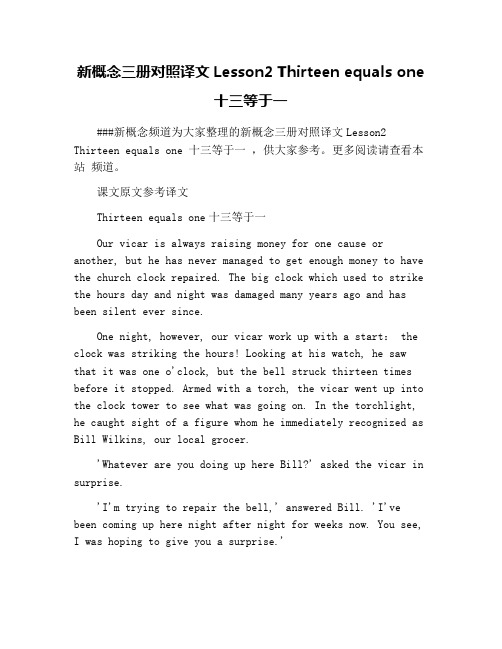
新概念三册对照译文Lesson2 Thirteen equals one十三等于一###新概念频道为大家整理的新概念三册对照译文Lesson2 Thirteen equals one 十三等于一,供大家参考。
更多阅读请查看本站频道。
课文原文参考译文Thirteen equals one十三等于一Our vicar is always raising money for one cause or another, but he has never managed to get enough money to have the church clock repaired. The big clock which used to strike the hours day and night was damaged many years ago and has been silent ever since.One night, however, our vicar work up with a start: the clock was striking the hours! Looking at his watch, he saw that it was one o'clock, but the bell struck thirteen times before it stopped. Armed with a torch, the vicar went up into the clock tower to see what was going on. In the torchlight, he caught sight of a figure whom he immediately recognized as Bill Wilkins, our local grocer.'Whatever are you doing up here Bill?' asked the vicar in surprise.'I'm trying to repair the bell,' answered Bill. 'I've been coming up here night after night for weeks now. You see, I was hoping to give you a surprise.''You certainly did give me a surprise!' said the vicar.'You've probably woken up everyone in the village as well. Still, I'm glad the bell is working again.'That's the trouble, vicar,' answered Bill. 'It's workingall right, but I'm afraid that at one o'clock it will strike thirteen times and there's nothing I can do about it."We'll get used to that, Bill,' said the vicar. "Thirteenis not as good as one, but it's better than nothing. Nowlet's go downstairs and have a cup of tea.'我们教区的牧师总是为各种各样的事筹集资金。
新概念英语第三册逐句精讲语言点第2课(上)

新概念英语第三册逐句精讲语言点第2课(上)Thirteen equals one十三等于一Our vicar is always raising money for one cause or another, but he has never managed to get enough money to have the church clock repaired. The big clock which used to strike the hours day and night was damaged many years ago and has been silent ever since.One night, however, our vicar work up with a start: the clock was striking the hours! Looking at his watch, he saw that it was one o'clock, but the bell struck thirteen times before it stopped. Armed with a torch, the vicar went up into the clock tower to see what was going on. In the torchlight, he caught sight of a figure whom he immediately recognized as Bill Wilkins, our local grocer.'Whatever are you doing up here Bill?' asked the vicar in surprise.'I'm trying to repair the bell,' answered Bill. 'I've been coming up here night after night for weeks now. You see, I was hoping to give you a surprise.''You certainly did give me a surprise!' said the vicar.'You've probably woken up everyone in the village as well. Still, I'm glad the bell is working again.'That's the trouble, vicar,' answered Bill. 'It's working all right, but I'm afraid that at one o'clock it will strike thirteen times and there's nothing I can do about it."We'll get used to that, Bill,' said the vicar. "Thirteen is not as good as one, but it's better than nothing. Now let'sgo downstairs and have a cup of tea."1.Our vicar is always raising money for one cause or another, but he has never managed to get enough money to have the church clock repaired.我们教区的牧师总是为各种各样的事筹集资金,但始终未能筹组资金把教堂的钟修好。
新概念英语第三册听力英音版02ThirteenEqualsOne
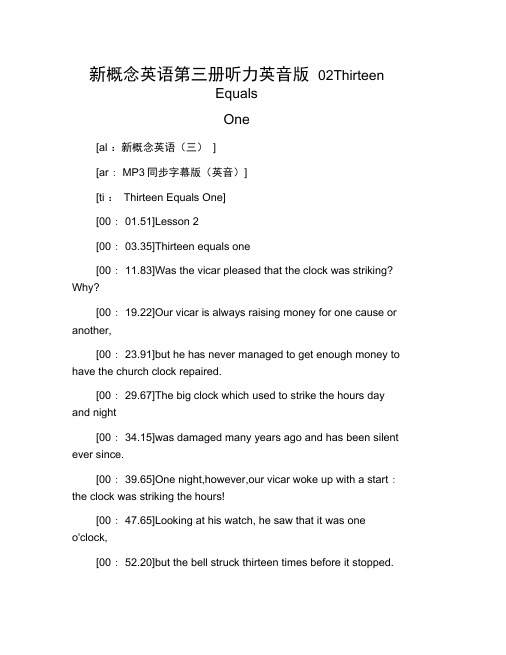
新概念英语第三册听力英音版02ThirteenEqualsOne[al :新概念英语(三)][ar : MP3同步字幕版(英音)][ti :Thirteen Equals One][00 : 01.51]Lesson 2[00 : 03.35]Thirteen equals one[00 : 11.83]Was the vicar pleased that the clock was striking? Why?[00 : 19.22]Our vicar is always raising money for one cause or another,[00 : 23.91]but he has never managed to get enough money to have the church clock repaired.[00 : 29.67]The big clock which used to strike the hours day and night[00 : 34.15]was damaged many years ago and has been silent ever since.[00 : 39.65]One night,however,our vicar woke up with a start : the clock was striking the hours![00 : 47.65]Looking at his watch, he saw that it was oneo'clock,[00 : 52.20]but the bell struck thirteen times before it stopped.[00 :56.70]Armed with a torch,the vicar went up into the clock tower to see what was going on.[01 :03.46]In the torchlight, he caught sight of a figure[01 :07.03]whom he immediately recognized as BillWilkins,our local grocer.[01 :13.50]'Whatever are you doing up here Bill?' asked the vicar in surprise.[01 :18.59]'I'm trying to repair the bell,' answered Bill.[01 :22.24]'I've been coming up here night after night for weeks now.[01 :25.95]You see,I was hoping to give you a surprise.'[01 :30.22]'You certainly did give me a surprise!' said the vicar.[01 :33.90]'You've probably woken up everyone in the village as well.[01 :37.75]Still,I'm glad the bell is working again.'[01 :42.30]'That's the trouble, vicar,'answered Bill.'It's working all right,[01 :47.03]but I'm afraid that at one o'clock it will strike thirteen times[01 :51.60]and there's nothing I can do about it.'[01 :54.92]'We'll get used to that,Bill,'said the vicar.[01 :57.77]'Thirteen is not as good as one,but it's better than nothing.[02 :02.21]Now let's go downstairs and have a cup of tea.'。
新概念第三册Lesson 2 Thirteen equals one讲义

新概念第三册Lesson 2 Thirteen equals one一、单词精讲equal v.等于【释义】:在数量、大小、价值、程度等方面相同,与...相等。
【词源】:源自拉丁语“aequalis”,表示平等的、相同的。
【短语】:equal to(等于;胜任);be equal in(在...方面相等)。
【例句】:Two plus two equals four.(2加2等于4。
)vicar n. 牧师【释义】:在基督教教会中,负责主持宗教仪式、管理教区事务、为教区居民提供宗教指导和精神支持的神职人员。
【词源】:源自古法语“vicaire”,再往前可追溯到拉丁语“vicarius”,表示替代者、代理人,因为牧师被视为上帝在人间的代理人。
【短语】:vicar of the parish(教区牧师);local vicar(当地牧师)。
【例句】:The vicar gave a very inspiring sermon on Sunday.(牧师在周日做了一场非常鼓舞人心的布道。
)raise v. 募集,筹(款)【释义】:收集、筹集资金或其他资源,通常是为了特定的目的(如慈善、项目等)。
使上升、提高(如提高价格、提高音量等);养育(孩子);种植(作物)等多种含义。
【词源】:源自古诺斯语“reisa”,表示抬起、举起,后引申为筹集(资金等使数量上升)等含义。
【短语】:raise money(筹款);raise funds for(为...筹集资金);raise up(举起;养育)。
【例句】:They are trying to raise funds for the new school building.(他们正在努力为新校舍筹集资金。
)torchlight n. 电筒光【释义】:手电筒发出的光,用于在黑暗中照明。
【词源】:由“torch”(手电筒)和“light”(光)组成,表示手电筒所发出的光线。
新概念英语逐句解读第三册第2课
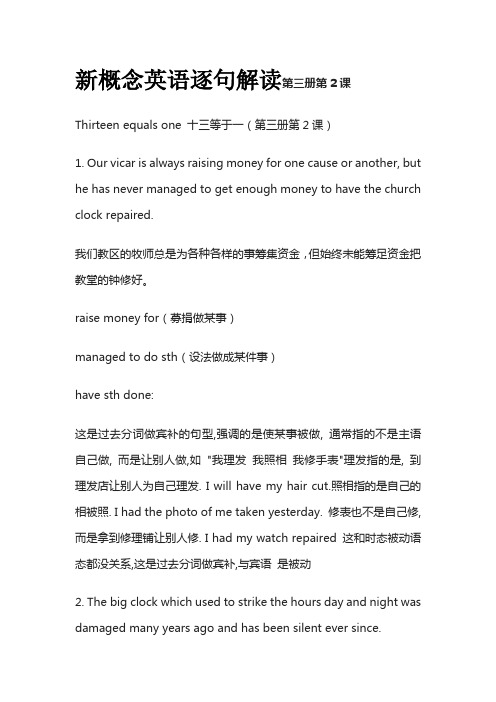
新概念英语逐句解读第三册第2课Thirteen equals one 十三等于一(第三册第2课)1. Our vicar is always raising money for one cause or another, but he has never managed to get enough money to have the church clock repaired.我们教区的牧师总是为各种各样的事筹集资金,但始终未能筹足资金把教堂的钟修好。
raise money for(募捐做某事)managed to do sth(设法做成某件事)have sth done:这是过去分词做宾补的句型,强调的是使某事被做, 通常指的不是主语自己做, 而是让别人做,如"我理发我照相我修手表"理发指的是, 到理发店让别人为自己理发. I will have my hair cut.照相指的是自己的相被照. I had the photo of me taken yesterday. 修表也不是自己修, 而是拿到修理铺让别人修. I had my watch repaired 这和时态被动语态都没关系,这是过去分词做宾补,与宾语是被动2. The big clock which used to strike the hours day and night was damaged many years ago and has been silent ever since.教堂的钟很大,以前不分昼夜打点报时,但在很多年前遭到了毁坏,从此便无声无息了。
used to(过去常常)要注意与be used to 以及get used to的区别:used to 后跟强调动作的动词时表示"过去常常";后面跟表示状态的词时,表示"曾经,一度"。
used to 的后面跟。
新概念3第二课讲义

新概念3第二课讲义Lesson 2 Thirteen equals one(1)Our vicar is always raising money for one cause or another, but he has never managed to get enough money to have the church clock repaired.1) is always rasing money所用的是现在进行时态的机构,但表达的是一般现在时态的内容。
这样使用正在进行时态时,除可以表达出一般现在时内容外,往往还含有一定的感情色彩〔如说明说话人的赞叹、厌倦等〕,如:He is always boasting. 一些副词常用于这样的结构中,以加强感情色彩。
除文中always外,常见的还有constantly,continually等,如:My father is always losing his keys. 我父亲总是丢钥匙。
He is continually aksing me for money.他总是不断问我要钱。
2) raise . vt. 引起,抱起;提高〔价格等〕;养育;筹集vi. 上升,升高He raised his hand to wave the crowd.If you raise your voice, you speak more loudly, usually because you are angry. If you raise money for a charity or an institution, you ask people for money which you collect on its behalf.My mother was an amazing woman. She raised four of us kids virtually singlehandedly.3) manage to 设法做成某事,必须付出努力。
新概念 英语第三册 第二课 Lesson 2 thirteen equals one 十三等于一
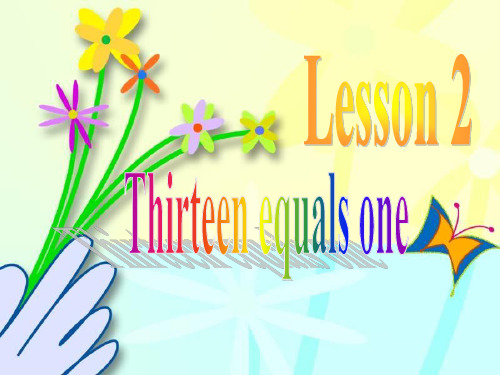
11. Who did he find there?
12. What was Bill trying to do? Bill Wilkins. 13. Howtryinghadrepair thetrying to do this? He was long to he been clock. 14. What did Bill trying to do? For weeks. 15. Did he succeed in giving the vicar a surprise? Give the vicar a surprise. 16. What did the vicar say about the village? Yes, he did. 17. Why hadn’t the clock been everyonerepaired? That Bill had probably woken properly up. 18. What it struck thirteen times at one o’clock. Because could Bill do about this? 19. Did the vicar mind about this? Because Nothing. thirteen is better than nothing.
大本钟,伦敦非常著名的里程碑之一, 于上周六迎来了它首次报时以来的 第150个生日。
maintenance [‘meintinəns] 维修
The Great Bell, first struck the hour on July 11, 1859, and has been interrupted only stop for maintenance and bad weather ever since. 本钟自1859年7月11日首次报时以来, 大本钟仅在维修或天气恶劣时才偶尔 暂停运转。
新概念英语第三册逐句精讲语言点第2课(下)
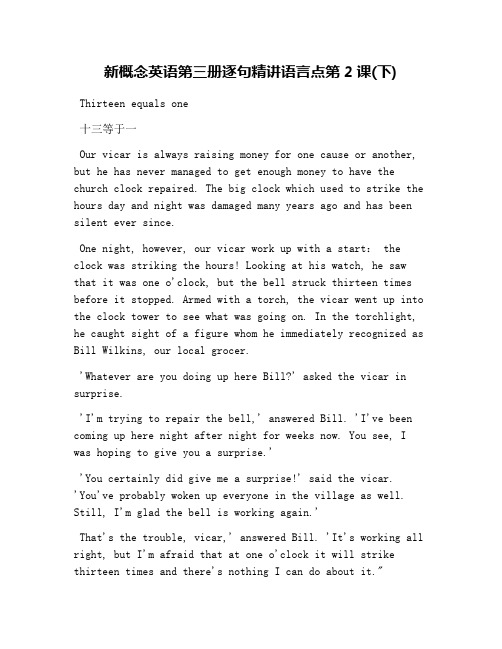
新概念英语第三册逐句精讲语言点第2课(下)Thirteen equals one十三等于一Our vicar is always raising money for one cause or another, but he has never managed to get enough money to have the church clock repaired. The big clock which used to strike the hours day and night was damaged many years ago and has been silent ever since.One night, however, our vicar work up with a start: the clock was striking the hours! Looking at his watch, he saw that it was one o'clock, but the bell struck thirteen times before it stopped. Armed with a torch, the vicar went up into the clock tower to see what was going on. In the torchlight, he caught sight of a figure whom he immediately recognized as Bill Wilkins, our local grocer.'Whatever are you doing up here Bill?' asked the vicar in surprise.'I'm trying to repair the bell,' answered Bill. 'I've been coming up here night after night for weeks now. You see, I was hoping to give you a surprise.''You certainly did give me a surprise!' said the vicar.'You've probably woken up everyone in the village as well. Still, I'm glad the bell is working again.'That's the trouble, vicar,' answered Bill. 'It's working all right, but I'm afraid that at one o'clock it will strike thirteen times and there's nothing I can do about it."We'll get used to that, Bill,' said the vicar. "Thirteen is not as good as one, but it's better than nothing. Now let's go downstairs and have a cup of tea."7.Whatever are you doing up here Bill? asked the vicar in surprise.“你究竟在上面干什么,比尔?”牧师惊讶的问。
新概念三 2

Lesson 2, thirteen equals one 十三等于一Equal (be equal to sb/sth)与人/物相同,相等equal an Olympic record 平了奥运纪录be equaled/matched by no one in kindness没人比他更善良be equaled by no one in intelligence 没有人比他更聪明Parallel 平行的parallel lines 平行线—〉(be equal to , match )与--相当,相匹a record never paralleled 一个举世无双的纪录conditions unparalleled/unmatched/unequaled elsewhere in the world 世界上其它地方无法匹敌的条件(be comparable or similar to)可与--相比,相类似your experience parallels mine 你的经历和我的经历差不多Be equivalent to sth (equal in value, amount, meaning, importance)(数值,意义,重要性)相同的250 grams or an equivalent amount in ounce 250克或者与之相当的盎司【It is six of one and a half of dozen of the other(两个都不好,半斤八两)】Parallel (be similar)a parallel case, career 相同的事例,职业产量到达---,这个数字在历史上从为达到过The production reached ----, a record/figure unparalleled/ unmatched/ unequaled by any year in its historyVicar 英国国教的牧师~~ priest 神父,牧师=clergyman Bishop 主教archbishop 大主教pope 教皇Worship the heaven and earth 祭祀天地offer sacrifice 供以祭品Nun 修女hermit 隐士monk 和尚abbey ~~monastery修道院nunnery 尼姑庵灵隐寺The temple of sacred seclusion小隐隐于林,大隐隐于市A common hermit lives in seclusion,a great hermit lives in societyraise(collect together)募集,筹措raise funds for charity 募集慈善基金 a fund-raising event 募捐活动Solicit (ask sb for money, help, votes earnestly)向某人要钱,帮助,选票从某人那里要钱/支持solicit money/support from sb= solicit sb for money /supportApportion (give sth as a share)分配某物,分派某物apportion blame among sb 怪罪大家apportionedcharges 摊派费用levy征收(collect payment by authority or force)levy a departure tax on all the travelers 向游客征收的离境税torchlight 电筒光flashlight 手电筒torch 火把,火炬carry a torch for sb 单相思,单恋某人carry a torch for an old sweetheart 单恋昔日情人childhood lovers 两小无猜,青梅竹马blaze/illuminate a new trail for sth 为---开辟一条新道路The textOur vicar is always raising money for one cause or another我们的教区牧师总是为了各种各样的事筹集资金1,be always doing 表示抱怨,不满的语气如今各种离奇丑闻老是成为头版新闻,从三聚氰胺事件到豆腐渣工程到警匪勾结事件。
新概念3-2英语第三册第二课

New concept English Lesson 2Thirteen equals one 十三等于一Was the vicar pleased that the clock was striking? Why?钟在敲响,牧师高兴吗?为什么?strike,碰,撞,打击Our vicar is always raising money for one cause or another,我们的牧师总是因为某个原因或其他原因在募资raising money,募资but he has never managed to get enough money to have the church clock repaired.但他从来没有设法得到足够的钱把教堂的钟修好The big clock which used to strike the hours day and night was damaged many years ago and has been silent ever since.这个原来日夜报时的大钟在很多年前被损坏,并且从那时起就一直沉寂。
One night, however, our vicar woke up with a start: the clock was striking the hours!然而,一个夜里,我们的牧师被惊醒:钟正在报时!with a start:吃了一惊Looking at his watch, he saw that it was one o'clock,看他的手表,他看见这时是一点钟but the bell struck thirteen times before it stopped.但是钟敲了十三下才停下来Armed with a torch, the vicar went up into the clock tower to see what was going on.拿着蜡烛,牧师走进钟楼,去看怎么回事。
新概念英语第三册+Lesson+2+Thirteen+equals+one+知识点课件

He is always making noises. 他总是吵吵闹闹,真烦人。
2. one or another:表示这样或那样 -- for one reason or another 处于这样或那样的原因 -- at one time or another 在这样或那样的时间 -- in one way or another 用这样或那样的方法
4. in the torchlight 在手电筒光下 / in the moonlight 在月光下 in the sunshine 在太阳光下 / in the candlelight 在烛光下
5. night after night 一夜连着一夜 day after day 一天又一天 / year after year 一年又一年 week after week 一周又一周 / bus after bus 一辆车接着一辆车
作名词时意为“罢工;抗拒;袭击;殴打;(体育中得分的)击球; The student union has called for a rent strike. lucky strike 好彩烟 ; 好彩 ; 好彩香烟 ; 幸运星 strike sb down 摧垮;使病倒;使丧命;击倒,撞倒(某人)
torchlight n.电筒光
6. still用于句首, 用逗号分隔开来, 表达一个转折的关系:虽然如此, 但是
Text
summary writing
Special difficulties 难点
in 1>与表达惊奇、恐惧、失望或生气等感情色彩的名词搭配连用, 在句中起状 语作用。 in surprise惊奇地 / in astonishment惊愕的 in alarm恐吓的 / in embarrassment窘迫的 in amazement极为惊讶 / in despair绝望的 in dismay沮丧的 / in anger恼火的 / in disappointment失望的 2>表示以、用。用于语言, 书写材料, 色彩或声音等方面。 in English / in pencil / in ink / in oil 用颜料 / in red用红色 / in code用代码 in such a high voice 用这么高的声音 / in a few words 用几句话 3>表示状态、情况或处境 in trouble / in difficulty在困境中 / in bed在床上 / in a hurry匆忙的 in debt负债 / in love with sb爱上某人 / in tears 流着泪 in good order有条不紊, 整齐, 情况正常 / in good repair 维修良好 in good health 身体好 / in poor health身体坏 in the bad mood 情绪坏 / in the good mood情绪好 in haste匆忙的,草率地,慌张地 / in a favor of excitement 欣喜若狂 in poverty 在贫穷中 / in luxury奢侈的
新概念3Lesson 2 Thirteen equals one 十三等于一
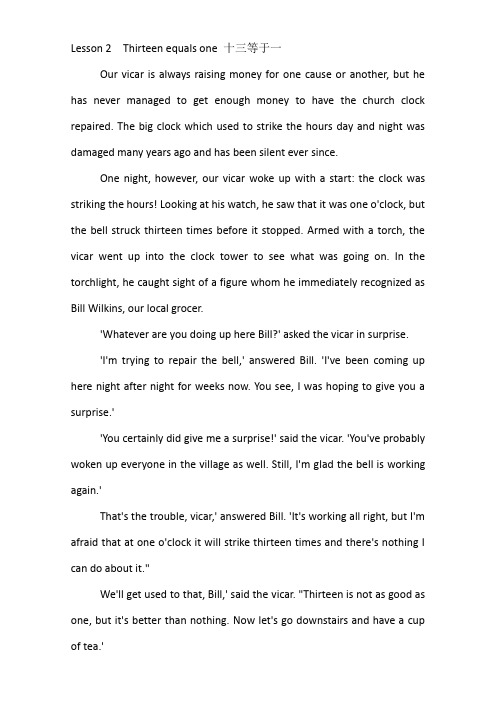
Lesson 2 Thirteen equals one 十三等于一Our vicar is always raising money for one cause or another, but he has never managed to get enough money to have the church clock repaired. The big clock which used to strike the hours day and night was damaged many years ago and has been silent ever since.One night, however, our vicar woke up with a start: the clock was striking the hours! Looking at his watch, he saw that it was one o'clock, but the bell struck thirteen times before it stopped. Armed with a torch, the vicar went up into the clock tower to see what was going on. In the torchlight, he caught sight of a figure whom he immediately recognized as Bill Wilkins, our local grocer.'Whatever are you doing up here Bill?' asked the vicar in surprise.'I'm trying to repair the bell,' answered Bill. 'I've been coming up here night after night for weeks now. You see, I was hoping to give you a surprise.''You certainly did give me a surprise!' said the vicar. 'You've probably woken up everyone in the village as well. Still, I'm glad the bell is working again.'That's the trouble, vicar,' answered Bill. 'It's working all right, but I'm afraid that at one o'clock it will strike thirteen times and there's nothing I can do about it."We'll get used to that, Bill,' said the vicar. "Thirteen is not as good as one, but it's better than nothing. Now let's go downstairs and have a cup of tea.'。
新概念英语第三册课程讲解
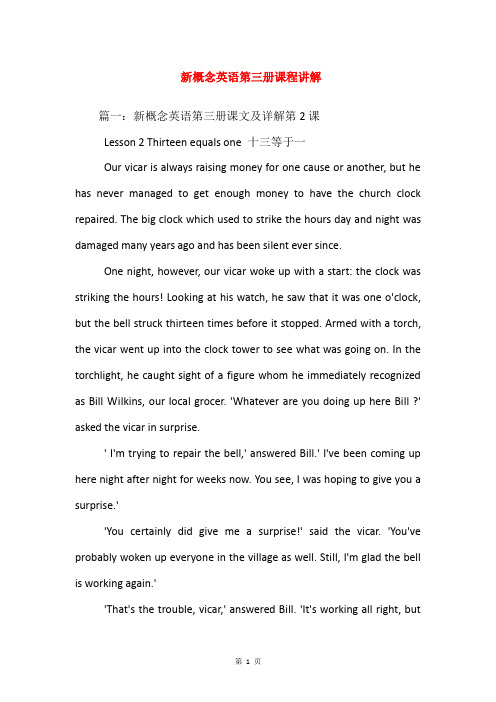
新概念英语第三册课程讲解篇一:新概念英语第三册课文及详解第2课Lesson 2 Thirteen equals one 十三等于一Our vicar is always raising money for one cause or another, but he has never managed to get enough money to have the church clock repaired. The big clock which used to strike the hours day and night was damaged many years ago and has been silent ever since.One night, however, our vicar woke up with a start: the clock was striking the hours! Looking at his watch, he saw that it was one o'clock, but the bell struck thirteen times before it stopped. Armed with a torch, the vicar went up into the clock tower to see what was going on. In the torchlight, he caught sight of a figure whom he immediately recognized as Bill Wilkins, our local grocer. 'Whatever are you doing up here Bill ?' asked the vicar in surprise.' I'm trying to repair the bell,' answered Bill.' I've been coming up here night after night for weeks now. You see, I was hoping to give you a surprise.''You certainly did give me a surprise!' said the vicar. 'You've probably woken up everyone in the village as well. Still, I'm glad the bell is working again.''That's the trouble, vicar,' answered Bill. 'It's working all right, butI'm afraid that at one o'clock it will strike thirteen times and there's nothing I can do about it.''We'll get used to that, Bill,' said the vicar. 'Thirteen is not as good as one, but it's better than nothing. Now let's go downstairs and have a cup of tea.'Attention: The points here are not covered by the mp3. It is better for you to listen to the mp3 first and try to take notes on your own.1, Our vicar is always raising money for one cause or another, but he has never managed to get enough money to have the church clock repaired.现在进行时和always 等频度副词的搭配--表示说话人带有的情感色彩Tom is always doing homework.He is always making noises.one or another 表示某种、这样或那样get enough money 筹集足够的资金来做某事have sth. done 找某人来做某事e.g. have the plane repaired 修飞机have hair cut 剪头发tip: 在翻译中,不一定要把"找人"这两个字翻译出来,但是读者可以据常理推断这件事不是句中的主语做出的。
(完整版)新概念英语第三册课文及详解第2课
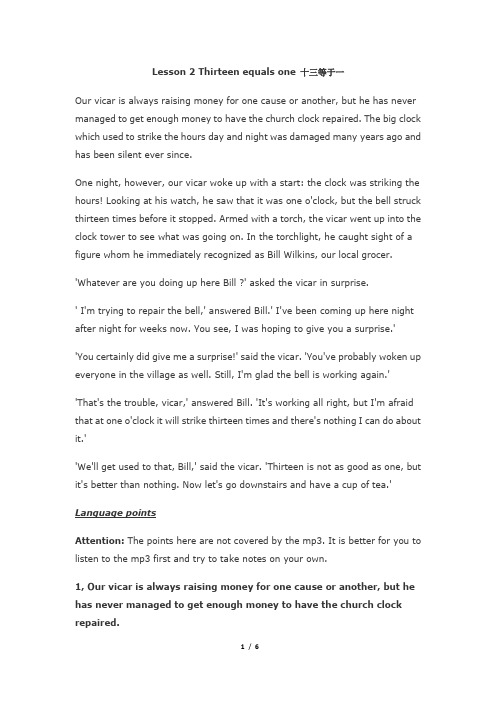
Lesson 2 Thirteen equals one 十三等于一Our vicar is always raising money for one cause or another, but he has never managed to get enough money to have the church clock repaired. The big clock which used to strike the hours day and night was damaged many years ago and has been silent ever since.One night, however, our vicar woke up with a start: the clock was striking the hours! Looking at his watch, he saw that it was one o'clock, but the bell struck thirteen times before it stopped. Armed with a torch, the vicar went up into the clock tower to see what was going on. In the torchlight, he caught sight of a figure whom he immediately recognized as Bill Wilkins, our local grocer.'Whatever are you doing up here Bill ?' asked the vicar in surprise.' I'm trying to repair the bell,' answered Bill.' I've been coming up here night after night for weeks now. You see, I was hoping to give you a surprise.''You certainly did give me a surprise!' said the vicar. 'You've probably woken up everyone in the village as well. Still, I'm glad the bell is working again.''That's the trouble, vicar,' answered Bill. 'It's working all right, but I'm afraid that at one o'clock it will strike thirteen times and there's nothing I can do about it.''We'll get used to that, Bill,' said the vicar. 'Thirteen is not as good as one, but it's better than nothing. Now let's go downstairs and have a cup of tea.'Language pointsAttention: The points here are not covered by the mp3. It is better for you to listen to the mp3 first and try to take notes on your own.1, Our vicar is always raising money for one cause or another, but he has never managed to get enough money to have the church clock repaired.现在进行时和always 等频度副词的搭配--表示说话人带有的情感色彩Tom is always doing homework.He is always making noises.one or another 表示某种、这样或那样get enough money 筹集足够的资金来做某事have sth. done 找某人来做某事e.g. have the plane repaired 修飞机have hair cut 剪头发tip: 在翻译中,不一定要把"找人"这两个字翻译出来,但是读者可以据常理推断这件事不是句中的主语做出的。
新概念英语第三册lesson 2

2. The big clock which used to strike the hours day and night was damaged many years ago and has been silent ever since. used to do 过去常常做 be used/accustomed to doing习惯于做某事 be used to do sth 被用来做
Strike v. 敲打,打击 n. 罢工 strike the hours 报时 strike twelve 钟敲十二点 At first he didn‟t recognize the name, but then it suddenly struck home. (突然记起来了) strike the right note 说到点子上了;做事恰到好处 on strike 罢工
3. One night, however, our vicar woke up with a start: the clock was striking the hours! with a start 吃惊 in surprise 惊奇 to one‟s surprise令某人吃惊的是 be astonished at对……震惊 be shocked at 对……震惊 be amazed at 对……吃惊(带有敬佩)
local government 地方政府 local time本地时间 catch sight of 看到 lose sight of 看不见 catch a glance of (迅速)扫视 take a quick look at 迅速得看一眼 take a peep at 偷看 stare at 盯着看,凝视 glare at 怒目而视 glance at 瞥见
新概念三 第二课 Thirteen equals one 课件

不辞辛劳做某事
Was the vicar pleased that the clock was striking? Why?
Let’s read
Where does the maintenance cost come from? Does it raise money from the public?
raise
vt. 举起
v. 筹集,募集;养育
养家/马 raise one’s hand
raise money 筹钱 raise a family/a horse 举手
The vicar offered Bill Wilkins a cup of tea because . a. he thought that Bill Wilkins was thirsty b. thanks to him, the clock would now strike once an hour c. he was grateful for the trouble Bill wilkins had taken d. he was pleased to have been woken up for nothing
3 million pounds equals 28 million RMB
A equals B(v.) be equal to (adj.) ① 与…相匹敌
②胜任 ,有能力做…(to为介词)
e.g. 如果A=B,B=C,那么A=C。 If A equals B and B equals C, then A equals C.
The vicar was surprised to see Bill Wilkins in the clock tower because________. a. Bill Wilkins had been hopห้องสมุดไป่ตู้ng to surprise him b. it was an unusual time and place to find him c. he had expected to find a figure d. the clock had struck thirteen times
新概念英语第三册:Lesson 2 Thirteen equals one

Lesson 2 Thirteen equals one一、单词讲解New words and expressionsequal ['i:kwəl] v.等于vicar ['vikə] n.牧师raise [reiz] v. 募集,筹(款)torchlight ['tɔ:tʃlait] n.电筒光Equal v. / adj. 与…相等1)adj. 与----相等;(be equal to)eg. Wealth is not equal to happiness. 财富不等同于幸福。
EEOC:Equal Employment Opportunities Commission 平等就业委员会(A US government organization whose aim is to make sure that people are not prevented from getting jobs because of their race, religion, age, sex etc, and to make sure that all workers are treated fairly and equally.) EEOC 是美国的一个政府型机构,它主要是致力于确保不同的种族,不同的宗教信仰,不同的年龄和性别等,不会在就业机会上有任何差异,并且确保所有的就业人员被公平与平等的对待。
中国学生易犯的错误:2)vt. 及物动词equal to: (X )("to" is unnecessary )所以‘equal’后面不用加‘to’因为它是及物动词。
vicar 英国教区的小牧师(of the Church of England)rector: of the Catholic Church 小牧师priest 神父(但特别是罗马天主教教堂里的神父) curate 副牧师curate's egg 有好有坏eg. The book is something of a curate's egg. 这本书好坏参半。
新概念第3册第2课2

• used to do 过去常做(现在不做)了 • be/get used to doing 习惯于做... • be used to do (被动) 被用做...
• ever since 引起完成时------自此…. Ever since he graduated he has been a busy man and seldom indulged in a holiday. 毕业后他 就是个忙人,难得有机会好好度假。
• on earth / the hell 究竟,到底 eg. Whatever it is? 管他呢! (不屑一顾)
• and whatever 等等 eg. We had a party, drink, dance and whatever. 我们开了一个派对,喝酒、跳舞,还有其它一些 活动。
• still 仍然,不过,还 • all the same
enough 的用法
• 1)enough用作副词,充当形容词或副词修饰语,但必须 后置。 又如: ①He walks slowly enough. 他走得够慢的了。 ②This article is difficult enough to write. 这篇文章够难写得了。
• 2)enough用作形容词作定语时,可修饰可数名词或不可 数名词,可放在被修饰的名词前或后。 ①There are enough seats(seats enough) for them all. 有足够的座位让他们都坐下。 ②I have enough time(time enough) to finish the work. 我有足够的时间来完成这项工作
• in the torchlight 借着手电筒的光 • in the moonlight 借着月光 • Excuse me. 借光,劳驾
- 1、下载文档前请自行甄别文档内容的完整性,平台不提供额外的编辑、内容补充、找答案等附加服务。
- 2、"仅部分预览"的文档,不可在线预览部分如存在完整性等问题,可反馈申请退款(可完整预览的文档不适用该条件!)。
- 3、如文档侵犯您的权益,请联系客服反馈,我们会尽快为您处理(人工客服工作时间:9:00-18:30)。
新概念英语第三册逐句精讲:第2课Thirteen equals oneLesson2 Thirteen equals one十三等于一新概念3课文内容:Our vicar is always raising money for one cause or another, but he has never managed to get enough money to have the church clock repaired. The big clock which used to strike the hours day and night was damaged many years ago and has been silent ever since.One night, however, our vicar work up with a start: the clock was striking the hours! Looking at his watch, he saw that it was oneo'clock, but the bell struck thirteen times before it stopped. Armed with a torch, the vicar went up into the clock tower to see what was going on. In the torchlight, he caught sight of a figure whom he immediately recognized as Bill Wilkins, our local grocer.'Whatever are you doing up here Bill?' asked the vicar in surprise.'I'm trying to repair the bell,' answered Bill. 'I've been coming up here night after night for weeks now. You see, I was hoping to give you a surprise.''You certainly did give me a surprise!' said the vicar. 'You've probably woken up everyone in the village as well. Still, I'm glad the bell is working again.'That's the trouble, vicar,' answered Bill. 'It's working all right, but I'm afraid that at one o'clock it will strike thirteen times and there's nothing I can do about it."We'll get used to that, Bill,' said the vicar. "Thirteen is not as good as one, but it's better than nothing. Now let's go downstairs and have a cup of tea."新概念英语3逐句精讲:1.Our vicar is always raising money for one cause or another, but he has never managed to get enough money to have the church clock repaired.我们教区的牧师总是为各种各样的事筹集资金,但始终未能筹组资金把教堂的钟修好。
语言点1:句子结构分析:but连接两个转折关系的并列句,转折的目的一般为否定前一个分句的意思,多为阅读中的考点。
to have the church clock repaired作目的状语。
语言点2:for one reason or another表示说不清楚的原因或者不想一一说明的原因。
语言点3:manage to do sth是“设法做某事”的意思。
语言点4:在have the church clock repaired中,have sth done表示“让别人做某事”。
2.The big clock which used to strike the hours day and night was damaged many years ago and has been silent ever since.教堂的钟很大,以前不分昼夜打点报时,但在很多年前遭到毁坏,从此便无声无息了。
语言点1:句子结构分析:which引导定语从句,修饰clock。
第二个and连接两个并列的分句,说明大钟前后两种截然不同的情况。
语言点2:在used to strike the hours中,used to do sth表示过去常常做某事而现在不再做了。
语言点3:day and night表示“日日夜夜地”。
3.One night, however, our vicar work up with a start: the clock was striking the hours!一天夜里,我们的牧师突然被惊醒了,大钟又在“打点”报时了!语言点1:句子结构分析:however表示转折。
With a start接冒号及一个解释性的从句,说明牧师被惊醒的原因。
语言点2:由strike the hours还可以引申学习以下短语:Strike the clock 敲钟Beat/play a drum 打鼓Ring the bell 摇铃Alarm clock 闹钟4.Looking at his watch, he saw that it was one o'clock, but the bell struck thirteen times before it stopped.他一看表,才1点钟,可是那钟一连敲了13下才停。
语言点1:句子结构分析:that引导宾语从句,说明saw的内容。
But连接两个转折关系的句子,后面接before引导的时间状语从句,looking at his watch是现在分词短语,作伴随状语,其逻辑主语与主语一致,且动作是被动的。
语言点2:but引导的分词可以转换成一个强调句式:It was not until the thirteenth stroke that the bell stopped.5.Armed with a torch, the vicar went up into the clock tower to see what was going on.牧师拿着一支手电筒走上钟楼想去看看究竟发生了什么事情。
语言点1:句子结构分析:armed with a torch是过去分词短语作伴随状语,其逻辑主语与主句主语一致,且动作是被动的。
To see what was going on是动词不定式短语作目的状语,what was going on为宾语从句,说明see的内容。
语言点2:armed with sth意思是“拿着/带着某物”。
另外,armoneself/sb with sth的意思是“某人用某物武装自己”。
例句支持:He armed himself with a big stick while going out.他出门时带了一根大手杖防身。
语言点3:go on表示“发生”,多用于进行时态。
另外,日常口语中我们也可以用这个结构“打招呼”,例如:What's going on?(最近过得如何啊?) 除此之外,我们还可以这样说:(1)How is everything with you/going? 你一切都好吗?(2)How is the world around you? 你周围的情况怎样?(3)What is happening? 最近在忙些什么?(4)How is life treating you? 你过得怎样?6.In the torchlight, he caught sight of a figure whom he immediately recognized as Bill Wilkins, our local grocer.借着电筒光,他看见一个人,马上认出那是本地杂货店店主比尔威尔金斯。
语言点1:句子结构分析:in the torchlight作状语。
Whom引导定语从句,修饰figure。
Our local grocer作Bill Wilkins的同位语。
语言点2:由短语in the torchlight补充学习以下短语:In the sunshine/sunlight 在太阳光下In the moonlight 在月光下In the candlelight 在烛光下语言点3:catch sight of表示“看见”。
语言点4:recognise as表示“认出是”,recognise是个瞬间动词,不能用于进行时态。
例句支持:The policeman recognised her as a pickpocket.警察认出她是个小偷。
7.Whatever are you doing up here Bill? asked the vicar in surprise.“你究竟在上面干什么,比尔?”牧师惊讶的问。
语言点1:句子结构分析:这是一个典型的直接引语句式。
Up here在此是两个副词连用,意思是“在这儿”。
In surprise为方式状语。
语言点2:whatever常用于疑问句中,用以加强what的语气,表示“究竟什么”。
例句支持:Whatever do you mean? 你究竟是什么意思?Whatever did it happen to him? 他究竟发生了什么?8.I'm trying to repair the bell,' answered Bill. I've been coming up here night after night for weeks now.You see, I was hoping to give you a surprise.'“我想把这口钟修好,”比尔回答说。
